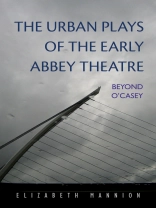Ireland’s Abbey Theatre was founded in 1904. Under the guidance of W. B. Yeats and Lady Augusta Gregory it became instrumental to the success of many of the leading Irish playwrights and actors of the early twentieth century.
Conventional wisdom holds that the playwright Sean O’Casey was the first to offer a new vision of Irish authenticity in the people and struggles of inner-city Dublin in his groundbreaking trilogy The Shadow of a Gunman, The Plough and the Stars, and Juno and the Paycock. Challenging this view, Mannion argues that there was an established tradition of urban plays within the Abbey repertoire that has long been overlooked by critics. She seeks to restore attention to a lesser-known corpus of Irish urban plays, specifically those that appeared at the Abbey Theatre from the theatre’s founding until 1951, when the original theatre was destroyed by fire. Mannion illustrates distinct patterns within this Abbey urban genre and considers in particular themes of poverty, gender, and class. She provides historical context for the plays and considers the figures who helped shape the Abbey and this urban subset of plays. With detailed analysis of box office records and extensive appendixes of cast members and production schedules, this book offers a rich source of archival material as well as a fascinating revision to the story of this celebrated institution.
Yazar hakkında
Elizabeth Mannion’s teaching and research focuses on drama and an interdisciplinary range of Irish studies, from revivalist drama to contemporary crime fiction. She is the editor of
The Contemporary Irish Detective Novel, and her research has appeared in numerous journals and anthologies, including
A History of Irish Working-Class Writing. She teaches at Baruch College, City University of New York.












